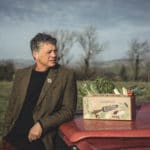While most of Devon is bright green, an emerging patchwork of fields is turning yellow. This is the kiss of death from glyphosate, the ‘world’s favourite herbicide’.
Most agriculture starts by removing any competing vegetation. In this case, the fields need to be cleared to sow maize, grown as feed for dairy cows. The choice is normally either to plough (inverting the top 15-25cm of soil), costing around £25 per acre, or to spray with glyphosate, costing around £15 per acre. Some argue that because glyphosate kills weeds without disturbing the soil, it is less damaging to the environment – and have even branded no-plough farming, facilitated by glyphosate, as ‘regenerative’.
At college, I was taught that glyphosate breaks down quickly and harmlessly on soil contact, has zero mammalian toxicity, and is harmless in our waterways. All of this turned out to be untrue. Whether glyphosate is less harmful than the soil disturbance caused by ploughing is unclear. Like all artificial pesticides, glyphosate is banned in organic farming.
Every year, I watch these fields die. What upsets me is that because maize likes a deep, loose seedbed, the fields will almost always be ploughed anyway. This begs the question: why spray as well? To add to the madness, much of the land will soon be covered with clear plastic film, to warm the soil and boost early growth. Since 2021, the EU has only allowed biodegradable film, which breaks down into CO2 and water. But in the UK, most of the film is oxo-degradable – which breaks down into microplastics that remain in the soil indefinitely. The effects are largely unknown, but initial research shows substantial changes to soil biology and uptake into the crops we eat. I am bemused that such widespread plastic pollution is deemed acceptable, while we congratulate ourselves on banning plastic straws. Some maize even goes to fuel subsidised anaerobic digesters to make ‘green’ electricity, despite having such a catastrophic environmental footprint.
My point here is not to demonise farmers, but to plead for a food and farming policy that accounts for environmental as well as financial costs. Farmers are not philosophers; they must make a living in the world as they find it. It’s the government’s job to create the framework, so that food production is not achieved at the cost of our planet.
















Do we have a regional/national breakdown of the conversion of field use to Maize – especially the ‘feeding’ of ADs. Here in Herefordshire we have great swathes of land that I wonder is directly converted to a number of AD sites. Farmers using this route to try to make a living but it’s detrimental to future use but also speeds up rapid soil erosion – all thoughts welcome
People without brains won’t understand your article or its irony sadly. And even more sad is that no one that should really read this article has any brains. Love the writing style and I do dream of a world that makes sense as well … politics, marketing, finance, commercial and other stuff like this does not make sense for more than the person enforcing it, in the moment it is enforced. This generally means words like sustainability, reliability, ecosystems and so on are just buzz words. I do hope someone will hear our cries one day 🤞
I don’t think it’s a question of brains, more of knowing and understanding. Even the least unaware person would not put something in their mouth that would do them harm if they knew and understood why. Rather, we have all been ‘brainwashed’ into thinking that governments and big business have our best interests at heart, when in fact all they have in their hearts is the desire to be re-elected/the bottom line of the balance sheet.
It’s up to us, those who are aware of the way in which people are manipulated by the money men using the all-purpose tool of advertising, to promote the message wherever we can and to use the power of the purse to influence the markets. Guy has led the way for years, often the lone voice, but I see signs that people are beginning to question what is in their food and to make changes where they can afford to.
To quote Churchill, we must just keep bu***ring on.